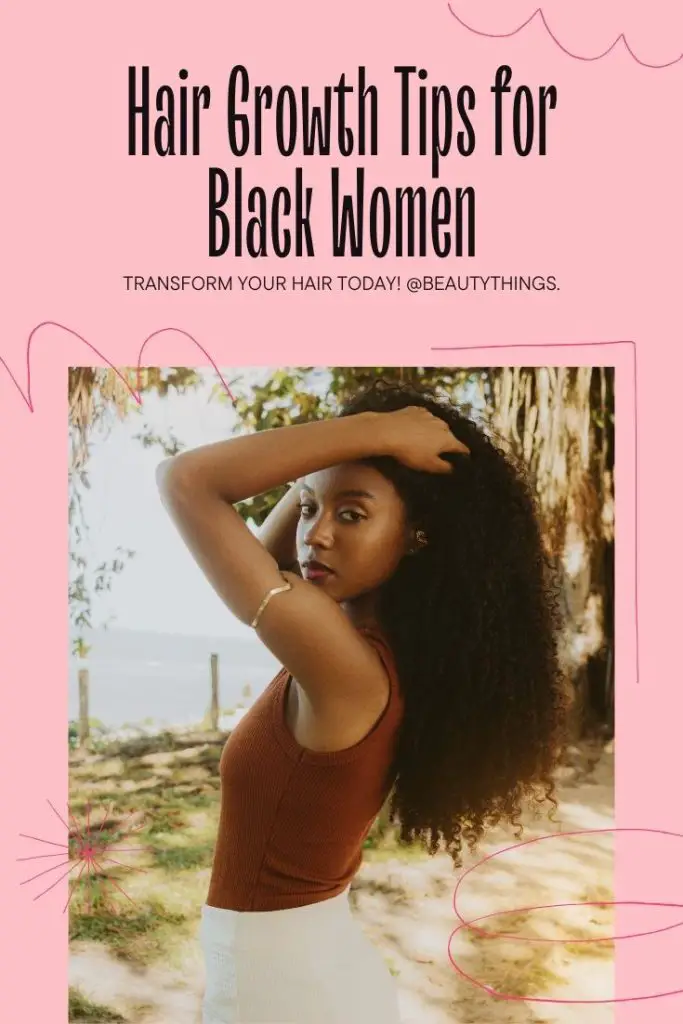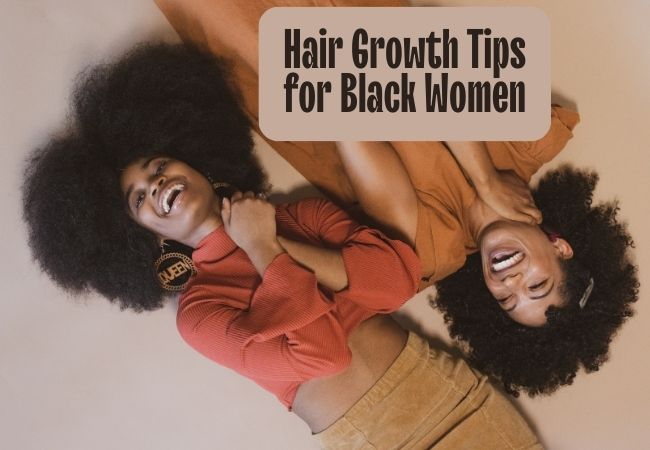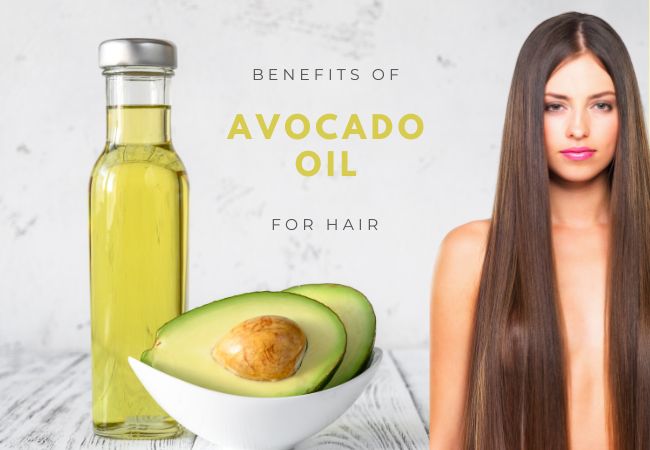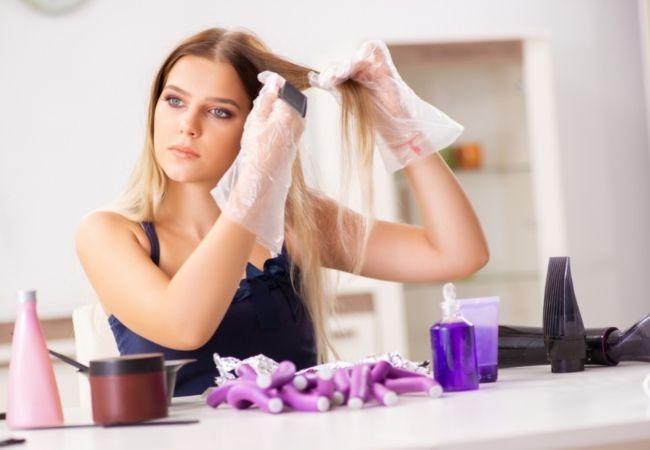These are the most effective hair growth tips for black women. The diverse textures of black hair, classified into 4A, 4B, and 4C, present unique challenges and opportunities for care.
Hair Growth Tips for Black Women
In this comprehensive post, I will delve into effective strategies and tips tailored to promote healthy hair growth in black women.
Understanding Black Hair
Overview of black hair types (4A, 4B, 4C)
Black hair comes in a variety of types, ranging from loose curls (4A) to tight coils (4C). For many black women, their hair type lies somewhere in between.
Understanding these classifications is fundamental in tailoring an effective hair care routine. For instance, 4A hair may benefit from lighter products, while 4C hair might require richer moisturizers.
Explanation of curly, coily, and kinky hair textures
A black woman can have different hair textures within her hair. The front of the head might be 4C while the back of the head might be 4B.
Curly hair often has defined, looser curls, while coily hair forms tight, small coils. Kinky hair, on the other hand, features densely packed, zigzag-shaped curls.
Kinky hair tends to shrink back to its natural position easily. Even when stretched through pulling, it will spring back.
The best way to know your hair type is to wash it and let it air dry without applying any products and observe the type of curls that form.
Factors influencing hair growth in black women
Hair growth in black women is influenced by a combination of genetic, hormonal, and environmental factors.
Understanding these elements helps in developing a holistic approach to hair care that caters to the specific needs of black hair.
Healthy Hair Habits
Importance of a balanced diet for hair health
Nourishing black hair starts from within. A balanced diet rich in essential nutrients, including vitamins (A, C, E), minerals (iron, zinc), and protein, promotes overall hair health.
Foods like leafy greens, nuts, seeds, and lean proteins should be incorporated into daily meals.
Hydration and its impact on hair growth
Adequate hydration is crucial for preventing dryness and breakage in black hair. Drinking enough water ensures that the body, including the hair follicles, stays hydrated.
Additionally, using water-based, leave-in conditioners helps maintain moisture levels in the hair. Hydration should be both inwards and outwards.
Proper Hair Care Routine
Gentle cleansing and conditioning
Choosing sulfate-free shampoos is vital for black hair as sulfates can strip away natural oils, leading to dryness.
Deep conditioning treatments with natural ingredients like shea butter or coconut oil help maintain moisture, improve elasticity, and enhance overall hair health.
Protective styling to minimize breakage
Low-manipulation hairstyles, such as twists or braids, reduce stress on hair strands, minimizing breakage.
Protective styles like buns or updos also shield the hair from environmental factors and prevent excessive friction.
Many black women also opt to wear wigs and weaves from time to time to give their natural hair a break from excessive manipulation.
Regular trimming for hair health
Regular trims are essential for preventing split ends, which can lead to breakage and stunted growth.
Trimming every 6-8 weeks helps maintain healthy ends and promotes overall hair vitality.
Some women are scared of trimming their hair fearing that they are losing inches. But the truth is that failing to trim your hair you are doing more harm than good to your hair.
Avoiding Damaging Hairstyles and Practices
Identifying hairstyles that may lead to breakage
Tight braids, ponytails, or styles causing tension on the edges can lead to breakage and hair loss.
Opting for looser styles and avoiding excessive tension preserves the integrity of the hair.
Excessive pulling of hair near the edges can lead to traction alopecia which can be difficult or even impossible to reverse.
Limiting heat styling to prevent heat damage
Heat styling tools can cause damage to the hair shaft. Some heat-intensive styles such as silk-presses should be limited and not done frequently.
Using heat protectants before styling and opting for lower heat settings reduce the risk of heat damage, preserving the natural structure of the hair.
Scalp Health
Importance of a healthy scalp for hair growth
A healthy scalp is the foundation for hair growth. It would be best if you had a clean scalp where the hair follicles are not clogged with buildup.
However, don’t overwash your hair and scalp. None of the two extremes is good for your hair.
Regular scalp massages stimulate blood circulation, promoting nutrient delivery to the hair follicles. Natural oils like jojoba or castor oil can be applied to nourish and moisturize the scalp.
Addressing common scalp issues
Dandruff and flakiness can be addressed with anti-dandruff shampoos containing ingredients like tea tree oil.
For an itchy or irritated scalp, avoiding harsh chemicals and using soothing treatments like aloe vera gel can provide relief.
When it comes to hair, it is good to note that there is nothing that works best for everyone. Some products do well for some people and fail to deliver for other people.
Hair Growth Supplements and Products
Overview of hair growth supplements
Supplements like biotin, known for promoting hair strength, and other vitamins, play a role in supporting overall hair health.
Collagen supplements which are widely used in skincare can also contribute to hair strength and resilience.
Recommending effective hair growth products
Moisturizing and growth-promoting hair oils, such as coconut oil, argan oil, or Jamaican black castor oil, provide essential nutrients and hydration.
Choosing sulfate-free and hydrating hair products further supports the health of black hair.
Check out these interesting posts on hair growth:
Lifestyle Factors Affecting Hair Growth
Managing stress for overall well-being
Stress can impact hormonal balance, affecting hair growth. Many women experience dandruff and acne breakouts when they are going through stress.
Incorporating stress reduction techniques such as meditation, yoga, or deep breathing exercises promotes overall well-being, positively influencing hair health.
Quality sleep and its role in hair growth
Establishing a consistent sleep routine ensures the body, including the hair follicles, undergoes proper regeneration.
Quality sleep contributes to overall vitality, promoting optimal hair growth.
Final Thoughts
In conclusion, if you want to nurture your natural hair as a black woman it’s best to adopt a holistic approach to hair care.
If you maintain healthy hair habits and avoid damaging practices your hair will grow steadily.
Every black woman’s hair journey is unique, and the key lies in patience. I hope this post on effective hair growth tips for black women was helpful. Follow me on beautythings Pinterest for more awesome hair and skin care posts.








